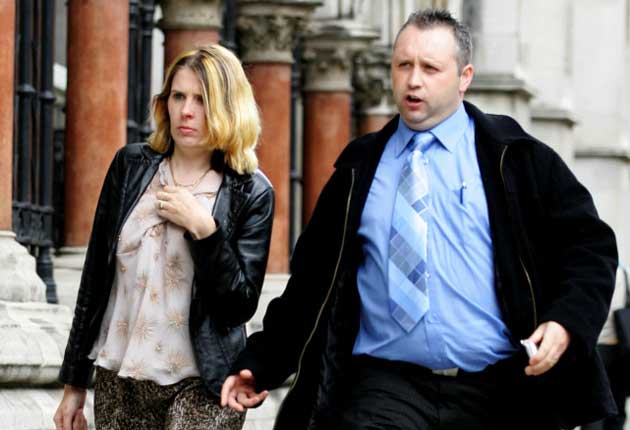Parents lose fight to keep alive chronically ill son 'Baby OT'
Nine-month-old brain-damaged boy dies after ventilator turned off to comply with court order

Your support helps us to tell the story
From reproductive rights to climate change to Big Tech, The Independent is on the ground when the story is developing. Whether it's investigating the financials of Elon Musk's pro-Trump PAC or producing our latest documentary, 'The A Word', which shines a light on the American women fighting for reproductive rights, we know how important it is to parse out the facts from the messaging.
At such a critical moment in US history, we need reporters on the ground. Your donation allows us to keep sending journalists to speak to both sides of the story.
The Independent is trusted by Americans across the entire political spectrum. And unlike many other quality news outlets, we choose not to lock Americans out of our reporting and analysis with paywalls. We believe quality journalism should be available to everyone, paid for by those who can afford it.
Your support makes all the difference.A chronically ill nine-month-old baby boy died yesterday morning after judges ruled treatment must be withdrawn. His parents were said by their lawyer to be too upset to face the media.
The child's death followed a controversial court ruling last Thursday that allowed doctors to turn off the ventilator that was keeping the boy alive. When he died shortly after 10am yesterday, it marked the end of a long fight by his parents to force doctors to keep treating him.
The child, known as Baby OT, was born with a rare condition – mitochondrial disorder – that leaves cells unable to function properly. He was brain-damaged and unable to breathe or swallow unaided.
Doctors treating him had said the boy's life was intolerable and his disability was such that his life had little purpose. But his parents argued that he experienced pleasure and had long periods when he was relaxed and pain-free.
During a 10-day High Court hearing in London last month, footage had been shown in which Baby OT was seen being cuddled and kissed by his parents. The child, who was in a cot filled with toy teddy bears, was shown sucking his mother's finger as she sang to him and stroked his head.
However, a doctor, identified only by the initial C, had told the hearing that he was certain Baby OT would be dead by the age of five. "What we are looking at is the quality of his life," he said. "Yes, I can understand that the parents may get tremendous pleasure from their interaction with him," the doctor said, but added: "How much pain and suffering should he be made to bear when the pleasures he gets from life are few and far between?"
The parents of Baby OT said that relationships with doctors had become "very difficult" at the end of last year. They said they had repeatedly been accused by doctors of being "irresponsible" in not following medical advice.
Last Thursday Mrs Justice Parker ruled that it was in the boy's best interests to withdraw "life-sustaining treatment". On Friday, two Court of Appeal judges refused the couple permission to challenge the decision.
Referring to the parents during the hearing, Lord Justice Ward said that the judges were "not unmindful of the horror of their predicament" and that it was impossible not to feel the "deepest sympathy" for them.
The baby, his parents and the hospital trust involved cannot be identified, as part of the court ruling.
In a comment issued after the judgment through their solicitor, Mr Christopher Cuddihee, the parents, identified only as Mr and Mrs T, said that they were "deeply distressed" by the decision to allow doctors to take their "only and beloved son" off the ventilator which was keeping him alive. They added: "We plan to enjoy what little time we have left with our son."
Shortly after the baby's death yesterday morning, his parents issued a brief statement: "During his short time with us, OT became the focus of our lives. We were present during his last moments, together with [his] extended family. He died peacefully. We will miss him greatly and wish to say that we are proud to have known our beautiful son for his brief life."
Commenting on the case last night, Dr Peter Saunders, the general secretary of the Christian Medical Fellowship, said: "This tragic case highlights both how precious human life is but also that there are limits to medicine. Withdrawal of treatment decisions can be agonisingly difficult, requiring great wisdom.
"Sadly, differences between parties can sometimes only be resolved by the courts. Our sympathy goes out both to the parents in their loss of a much-loved child and also to the doctors in having to make a very difficult judgement."
David Congdon, the head of campaigns and policy at the learning disability charity Mencap, said: "Our thoughts are with the family at what must be a traumatic time. The balance of a child's right to life and not causing a child distress or pain can be a difficult one.
"Ultimately, the decision taken has to be based on the best interest of the child. It is important with any decision taken that a disabled child's life is valued the same as any other child."
The case is one of just a handful in recent years which have seen relatives and doctors fighting courtroom battles over the right to life.
There are clear parallels with Charlotte Wyatt, who was brain-damaged at birth, and given a 5 per cent change of survival by doctors. Her parents, Darren and Debbie, fought a successful legal battle in 2006 to force medical staff to keep her alive. Charlotte is now five and learning to walk.
Join our commenting forum
Join thought-provoking conversations, follow other Independent readers and see their replies
Comments